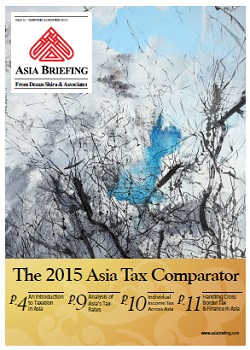 The newest issue of Asia Briefing magazine, titled “The 2015 Asia Tax Comparator“, is out now and available as a complimentary download in the Asia Briefing Bookstore.
The newest issue of Asia Briefing magazine, titled “The 2015 Asia Tax Comparator“, is out now and available as a complimentary download in the Asia Briefing Bookstore.
Contents:
- An Introduction to Taxation in Asia
- Analysis of Asia’s Tax Rates
- Individual Income Tax Across Asiave
- Handling Cross Border Tax & Finance in Asia
For foreign companies, deciding where to establish a direct presence in Asia can be a difficult process. Where once only a handful of the region’s nations fit the bill of being simultaneously inexpensive, safe and appropriate for foreign direct investment (FDI), now a number of other countries are shortening the gap between themselves and the region’s biggest economies. In particular, India appears on course to rival its neighbor China as a destination for FDI, and a number of the smaller economies in the Association of Southeast Asian Nations (ASEAN) are growing at a faster pace than ever before.
For these reasons, businesses must keep up-to-date with the numerous tax systems of the region. The tax laws of Asia, although connected to a certain extent through the region’s various double taxation agreements (DTAs), can vary dramatically from nation to nation. Understanding them can therefore help inform which of the region’s nations best suits a particular business operation.
In this issue of Asia Briefing, we compare and contrast the most relevant tax laws applicable for businesses with a presence in Asia. We analyze the different tax rates of 13 jurisdictions in the region, including India, China, Hong Kong, and the 10 member states of ASEAN, which consists of Brunei, Cambodia, Indonesia, Laos, Malaysia, Myanmar, the Philippines, Singapore, Thailand and Vietnam. We also take a look at some of the most important compliance issues that businesses should be aware of, and conclude by discussing some of the most important tax and finance concerns companies will face when entering Asia.
As the investor climate of Asia develops and its various rates of taxation continue to fluctuate, we hope that this issue of Asia Briefing can provide readers with a full understanding of the region’s current tax systems.
|
Asia Briefing Ltd. is a subsidiary of Dezan Shira & Associates. Dezan Shira is a specialist foreign direct investment practice, providing corporate establishment, business advisory, tax advisory and compliance, accounting, payroll, due diligence and financial review services to multinationals investing in China, Hong Kong, India, Vietnam, Singapore and the rest of ASEAN. For further information, please email asia@dezshira.com or visit www.dezshira.com. Stay up to date with the latest business and investment trends in Asia by subscribing to our complimentary update service featuring news, commentary and regulatory insight.
|
![]()
Manufacturing Hubs Across Emerging Asia
In this issue of Asia Briefing Magazine, we explore several of the region’s most competitive and promising manufacturing locales including India, Indonesia, Malaysia, Singapore, Thailand and Vietnam. Exploring a wide variety of factors such as key industries, investment regulations, and labor, shipping, and operational costs, we delineate the cost competitiveness and ease of investment in each while highlighting Indonesia, Vietnam and India’s exceptional potential as the manufacturing leaders of the future.
 The Gateway to ASEAN: Singapore Holding Companies
The Gateway to ASEAN: Singapore Holding Companies
In this issue of Asia Briefing Magazine, we highlight and explore Singapore’s position as a holding company location for outbound investment, most notably for companies seeking to enter ASEAN and other emerging markets in Asia. We explore the numerous FTAs, DTAs and tax incentive programs that make Singapore the preeminent destination for holding companies in Southeast Asia, in addition to the requirements and procedures foreign investors must follow to establish and incorporate a holding company.
 An Introduction to Tax Treaties Throughout Asia
An Introduction to Tax Treaties Throughout Asia
In this issue of Asia Briefing Magazine, we take a look at the various types of trade and tax treaties that exist between Asian nations. These include bilateral investment treaties, double tax treaties and free trade agreements – all of which directly affect businesses operating in Asia.



